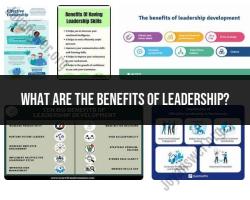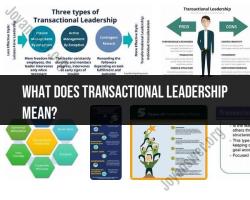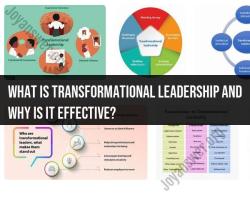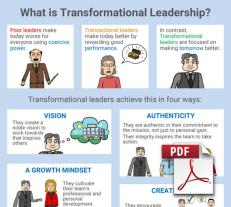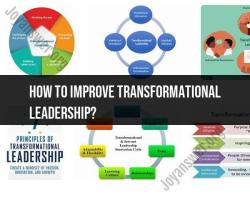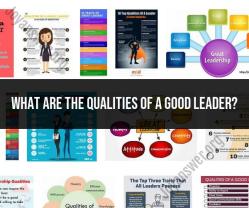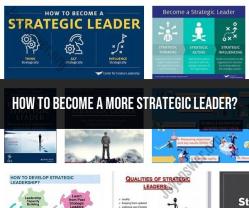What are the keys to successful leadership?
Successful leadership is a multifaceted endeavor that involves a combination of skills, qualities, and strategies. The keys to successful leadership encompass a wide range of factors that contribute to achieving excellence. Here are some essential elements:
Vision: Effective leaders have a clear and inspiring vision for the future. They can articulate this vision to their team, aligning everyone toward a common goal.
Communication: Strong communication skills are vital for leaders. They must be able to convey their ideas, actively listen to others, provide feedback, and foster open and transparent communication within the team.
Integrity: Honesty, ethical behavior, and consistency in actions and decisions are essential for building trust and credibility as a leader.
Empathy: Successful leaders understand the perspectives and feelings of team members. They demonstrate empathy and consider the well-being of others.
Decisiveness: Leaders need to make decisions, often under pressure. They analyze information, assess risks, and take action when necessary.
Adaptability: Leaders must be flexible and capable of adapting to changing circumstances and adjusting their strategies as needed.
Accountability: Taking responsibility for actions and outcomes is a hallmark of effective leadership. Leaders hold themselves and their teams accountable for performance.
Empowerment: Leaders empower team members by delegating responsibilities, providing opportunities for growth, and supporting individual development.
Problem-Solving: Leaders are skilled problem solvers. They analyze complex situations, identify solutions, and make informed decisions.
Resilience: Leaders encounter challenges and setbacks. Resilience allows them to bounce back from adversity and continue moving forward.
Team Building: Building and nurturing a cohesive, high-performing team is a core leadership skill. Leaders create a positive team culture and promote inclusivity.
Strategic Thinking: Successful leaders have a strategic mindset. They set long-term goals, plan for the future, and make decisions that align with their vision.
Confidence: Confidence inspires trust and motivates others. However, it should be balanced with humility to avoid coming across as arrogant.
Time Management: Effective time management is crucial for leaders to prioritize tasks and manage their workload efficiently.
Delegation: Leaders delegate tasks and responsibilities to team members based on their strengths and capabilities, trusting them to perform well.
Authenticity: Authentic leaders are true to themselves and their values, making them relatable and genuine in their interactions.
Openness to Feedback: Leaders actively seek and accept feedback from their team and are willing to learn and grow from it.
Inspirational: Successful leaders inspire and motivate their team by setting an example, demonstrating passion for their work, and promoting a shared sense of purpose.
Transparency: Transparency in decision-making and communication fosters trust and helps team members understand the reasoning behind actions and changes.
Innovative Thinking: Encouraging and fostering innovation and creativity within the team is essential for adapting to new challenges and opportunities.
Successful leadership is dynamic and continually evolving. Leaders develop and refine these qualities and skills over time, adjusting their approach as needed to address the unique needs of their team and organization. Leadership is not one-size-fits-all, and the specific qualities that are most important can vary depending on the context and goals of the team or organization.
1. Fundamental Keys to Successful Leadership in Any Organization
Effective leadership is a complex and multifaceted endeavor, but it often hinges on a few fundamental keys:
Vision and Direction: Leaders should have a clear vision for the organization's future and the ability to articulate that vision in a way that inspires and motivates others. They should also possess the strategic thinking skills to develop a plan to achieve that vision.
Communication and Interpersonal Skills: Effective leaders are skilled communicators who can listen actively, convey information clearly, and build strong relationships with their team members. They create a positive and inclusive work environment where people feel valued and respected.
Empowerment and Motivation: Leaders empower their employees by giving them the authority and resources they need to make decisions and contribute to the organization's success. They foster a culture of motivation and engagement, encouraging employees to reach their full potential.
Decision-Making and Problem-Solving Abilities: Leaders must be able to make sound decisions under pressure and have the ability to analyze complex problems and develop effective solutions. They should be able to weigh different perspectives and make choices that align with the organization's goals.
Adaptability and Flexibility: Leaders must be adaptable and flexible in their approach to leadership. They should be able to adjust their strategies and tactics to respond to changing circumstances and unforeseen challenges.
Integrity and Ethical Conduct: Leaders should uphold high standards of integrity and ethical conduct. They should act with honesty, transparency, and accountability, setting a positive example for others to follow.
2. Inspiring and Motivating Teams Towards Success
Inspiring and motivating teams requires a combination of leadership qualities and effective strategies:
Articulate a Compelling Vision: Clearly communicate the organization's vision and goals, emphasizing the impact of their work on the organization's success and the broader community.
Recognize and Reward Achievements: Regularly acknowledge and appreciate individual and team accomplishments, fostering a culture of recognition and celebration.
Encourage Participation and Feedback: Create an environment where team members feel comfortable sharing ideas and providing feedback, valuing their contributions to the decision-making process.
Empower and Delegate: Provide team members with the autonomy and resources they need to make decisions and take ownership of their work, fostering a sense of responsibility and engagement.
Promote Personal and Professional Growth: Encourage team members to develop their skills and knowledge, providing opportunities for training, mentoring, and career development.
3. Common Leadership Strategies that Consistently Lead to Positive Outcomes
While leadership styles may vary, there are common strategies that consistently lead to positive outcomes:
Set Clear Expectations and Goals: Clearly define expectations for individual and team performance, establishing measurable goals and objectives.
Provide Regular Feedback and Coaching: Offer regular feedback to team members, highlighting areas for improvement and providing constructive guidance for growth.
Promote Collaboration and Teamwork: Encourage collaboration among team members, fostering a sense of shared purpose and collective responsibility.
Create a Culture of Continuous Improvement: Encourage a growth mindset, emphasizing the importance of learning from mistakes and continuously seeking ways to improve processes and outcomes.
Empower Decision-Making at All Levels: Encourage decision-making at all levels of the organization, empowering team members to take ownership of their work and make informed decisions within their scope of responsibility.
4. Adaptability as a Crucial Role in Successful Leadership
Adaptability is a critical quality for successful leadership, as it allows leaders to navigate change and uncertainty effectively:
Embrace Change: Recognize that change is inevitable and view it as an opportunity for growth and innovation.
Be Flexible and Open-minded: Be willing to adjust strategies and approaches based on new information or changing circumstances.
Encourage Adaptability in Others: Foster a culture of adaptability within the organization, empowering team members to embrace change and find creative solutions to challenges.
Continuously Learn and Adapt: Actively seek out new knowledge and skills, staying informed about industry trends and adapting to evolving challenges.
Communicate Effectively During Change: Keep team members informed about changes and provide clear guidance throughout the transition process.
5. Challenges Often Faced by Leaders on Their Journey to Success
Leaders often face a variety of challenges on their journey to success, including:
Communicating Effectively with Diverse Audiences: Leaders must tailor their communication style to different audiences, considering their level of understanding, perspectives, and cultural backgrounds.
Managing Conflict and Resolving Disagreements: Leaders must effectively manage conflict within teams, fostering respectful dialogue, finding common ground, and reaching mutually agreeable solutions.
Balancing Competing Priorities: Leaders must prioritize tasks and projects effectively, balancing the needs of different departments, stakeholders, and external influences.
Making Difficult Decisions Under Pressure: Leaders must make sound decisions under pressure, weighing various perspectives, considering potential risks and consequences, and taking decisive action.
Maintaining Motivation and Engagement: Leaders must keep team members motivated and engaged, especially during challenging periods, recognizing achievements, and fostering a positive work environment.


